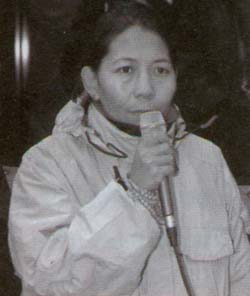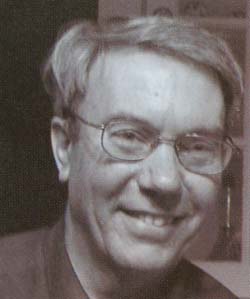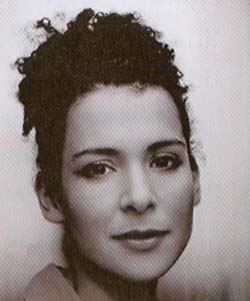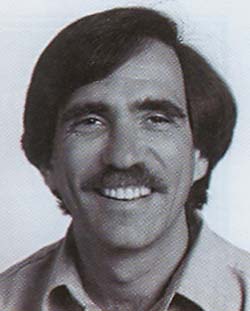In Action: Dolma Choephel Tibetan Hunger Striker

“Talking and doing are two different things,” declares Dolma Choephel, thirty years old, a member of the Tibet Youth Congress, the largest and most active non-governmental organization of Tibetans in exile. “I had been talking so much about the Tibetan issue, I was ready to do something practical.”In that spirit, last spring Choephel and two of her colleagues left their home in the Tibetan exile community of Dharamsala, India, and flew to New York City, where they began a hunger strike in front of the United Nations in midtown Manhattan to protest human rights abuses in Chinese-controlled Tibet.
The group’s demands included a call for the proper religious education of the 11th Panchen Lama, the second-ranking figure in the Gelug school of Tibetan Buddhism, who is currently being detained by the Chinese government. At thirteen, the Panchen Lama is the world’s youngest known political prisoner. The group also called for the United Nations to station a human rights monitor in Tibet, and for the release of several imprisoned Tibetan religious leaders, one of whom has been sentenced to death.
After consuming only three small glasses of water each day for nearly a month, Choephel collapsed and was rushed to the hospital. When she was released three days later, her colleagues met with U.N. Assistant Secretary-General Carolyn McAskie and agreed to call off the hunger strike. Secretary-General Kofi Annan instructed McAskie to assure the hunger strikers that their message had been heard and that the U.N. would “follow up” on the group’s demands.
Although His Holiness the 14th Dalai Lama supports the goals of the Congress, he disapproves of the hunger strikes, which he considers acts of violence toward one’s body. But like the self-immolating monks during the Vietnam War era, Choephel considers her act one of constructive self-sacrifice. “As a Buddhist woman, I accept the hunger strike as a nonviolent part of our struggle,” she says. “I may make myself hurt, but I am not going to hurt anybody else. By offering myself, I am doing something for six million people. I feel doing something for the betterment of living beings is the Buddhist way.
In Action: David Kaczyski Death-Penalty Opponent

Until 1996, David Kaczynski had been living the unassuming life of an ordinary social worker, serving as an assistant director to an organization providing shelter to troubled youths in Schenectady, New York. Kaczynski and his wife, Linda, both practicing Buddhists, enjoyed the quiet anonymity of a life helping others. But that quickly changed when Kaczynski, fearing for the safety of others, informed the FBI of his suspicions that his brother, Ted, was the so-called Unabomber, whose letter bombs had killed three and injured twenty-three others between 1978 and 1995.
Although the FBI had agreed to keep Kaczynski’s role in the investigation confidential, the story of his involvement was leaked almost immediately after his brother’s arrest. Overnight, Kaczynski became a key figure in a story that gripped the nation and fed a sensationalistic press. Worse, the U.S. Justice Department sought the death penalty for Kaczynski’s brother, despite clear evidence that Ted was suffering from severe mental illness.
It would have been easy enough to shrink from the publicity, but Kaczynski and Linda made good use of it. Stepping into the unwelcome glare of the media spotlight, they became vocal opponents of the death penalty. “After seeing Ted dehumanized by the prosecution rather than treated as a mentally ill person, I knew that I had to do something to change this flawed system.”
Ted pled guilty in exchange for life without parole, and the couple took up the fight on behalf of others. Kaczynski, now executive director of New Yorkers Against the Death Penalty (NYADP), www.nyadp.org, sees his work to fight capital punishment as fundamentally rooted in Buddhist philosophy: “The human birth is an opportunity to move closer to enlightenment,” Kaczynski says. “Execution cancels that gift.”
A student in the Kagyu school of Tibetan Buddhism, Kaczynski says, “My work is a form of practice, one that requires patience and openness. I try to develop skillful means to draw people into a more compassionate understanding of the human condition.” With Kaczynski at the helm, NYADP has succeeded in convincing numerous influential groups in the state, including the New York Bar Association and most of New York’s major city councils, to support a moratorium on the death penalty.
In Action: Mariane Pearl Journalist

Four months after September 11, Mariane Pearl, a journalist and practicing Soka Gakkai Buddhist, was traveling with her husband in Pakistan when he was captured by terrorists. Pearl, who was four months pregnant, joined a crew of Pakistani police officers and began the arduous search for her husband. “When we were searching for Danny I would chant nam-myoho-renge-kyo (‘Devotion to the Lotus of the Wonderful Law’) and know that he also was chanting,” Pearl says. “ This was an act of resistance. It was obvious to me that the terrorists were trying to instill fear. I knew right away what to do, which was to chant so I would not be paralyzed.”
Four days later, Daniel’s captors began sending emails with images of Daniel Pearl held hostage. After a month of uncertainty and fruitless negotiations, the U.S. State Department finally confirmed Daniel Pearl’s grisly execution, taped by his captors.
“When I learned that Danny was dead, I did not consider revenge for a second. Politicians are not going to win a war on terror with bombs. People are going to win the war, with the way they react to terrorism and the way they live up to their values,” Pearl says. She moved to New York, gave birth to her son, Adam, and published A Mighty Heart: The Brave Life and Death of My Husband Danny Pearl, a account of her husband’s death and her survival in its wake, remarkable for its lack of rancor.
“By writing about my faith, courage, practice, and resistance, I am fighting the war on terror,” Pearl explains. “Terror is so powerful that you can lose all your capacity to even react. As a victim of terror, you have the opportunity to live up to your values. Buddhism was a very solid ground on which I was walking. My own practice—one that has guided me for over eighteen years—gave me insight into our terrible situation, insight into the motives of the terrorists, and insight into the real and present risk of death. If nations respond to terrorism the way I have, we will win.”
In Action: James Baraz Teacher & Activist

Fed up with the Bush administration’s policies, last winter Vipassana teacher James Baraz resolved to move from contemplation to action and organized a political house party through the on-line activist group MoveOn.org. Although Baraz found the event riveting, he saw an unrealized potential for something greater. “Instead of people just scratching their heads and thinking, ‘Gosh, we’re in such awful shape here,’ I wanted people to think about what would inspire them. I started envisioning a spiritually based activism,” says Baraz, who is the co-founder of Spirit Rock Meditation Center in Woodacre, California. “I wanted to tap into the frustration, outrage, and anger—to go deeper to the place where we really care, and then move that caring into action.”
So last spring, Baraz—along with other Buddhist teachers, leaders of various faiths, and a group of volunteers—organized “Spirited Action: Coming Together for Change,” an evening of inspirational speakers, guided meditations, and pragmatic plans to vote Bush out of office, all while remaining rooted in the spiritual values of compassion, peace, and deep understanding. “I felt like we were midwives to an energy that is being born across the nation,” Baraz says. “So many people were motivated to take the next step—to work on voter registration, to donate money to campaigns, and to organize events of their own—that we knew that we had to continue with our efforts.” The evening evolved into a larger Spirited Action activist network (www.spiritedaction.org), which describes itself as “committed to making it easy and inspiring for people to channel their care for the world into direct political action toward positive progressive change in the United States.” Through its website and network of volunteers, Spirited Action offers strategies, resources, and events for people interested in working toward an administration change in the November presidential election.
“It’s up to everyone who cares, particularly dharma practitioners, to transform the suffering in the world into contagious inspiration,” says Baraz. “I want to come to November knowing that I have done everything that I could to promote positive change in this country and know that I have done it in a way that inspires others to do the same.”